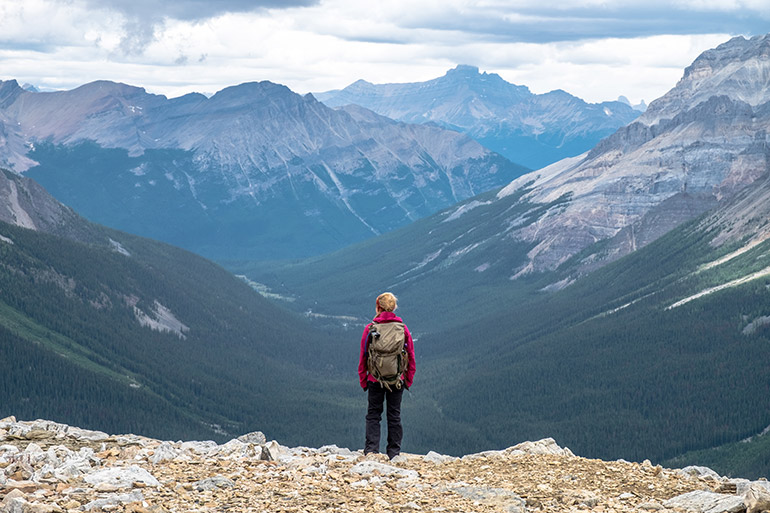
UBCO experts offer tips on how to camp and hike cleanly.
Experts offer advice on how to enjoy nature in an eco-friendly way
The last long weekend of the summer is approaching and many will seek refuge in nature. However, this doesn’t bring comfort to all. Conservationists and border communities on provincial and national parks are concerned about increased visits and cavalier attitudes toward protected spaces.
Experts from UBCO’s Irving K. Barber Faculty of Science offer a few suggestions on how to leave only footprints behind for campers, hikers and nature enthusiasts.
Think about wastewater, says Jeff Curtis, associate professor, earth, environmental and geographic sciences
“All our waste, liquid or otherwise, that we leave behind seeps into the ecosystem. Lakes, rivers and other bodies of water can easily become polluted with so many people washing, rinsing and flushing.
Consider using biodegradable soap and toothpaste. Also, be aware of where you dispose of liquid waste. Be at least 60 metres away from any body of water and think of humans and wildlife downstream.”
Mind the rules and be respectful, says Kevin Hanna, associate professor, earth, environmental and geographic sciences and director of UBC’s Centre for Environmental Assessment Research
“Be considerate of our Indigenous communities and their land—we are guests. Rules for hunting, fishing, and land and water vehicles are there for a reason—to protect BC’s natural environments for future generations.
Know the rules and stick to them. It’s especially important this year as more people are using the backcountry, and many are trying new outdoor activities.
All wild animals should be treated with care and caution; no matter how big or small they are. Be respectful of wildlife and help protect their habitats. We are visitors to their homes.”
Be fire-smart, says Mathieu Bourbonnais, assistant professor, earth, environmental and geographic sciences
“We have been very fortunate with the limited number of wildfires this summer. However, just because there aren’t fire bans in place doesn’t mean we can relax on fire safety. Wildfire risk changes quickly and a few sparks from an ATV or a campfire in the right conditions can quickly lead to an uncontrolled blaze.
Campfire restrictions can occur at any time so be aware and be prepared. If you are lucky enough to roast marshmallows, keep the fire in the pit, keep it manageable and pour water on the coals and stir them to fully extinguish it.”
Leave no trace, says Lael Parrott, professor in sustainability and director of the Okanagan Institute for Biodiversity, Resilience and Ecosystem Services
“It is intuitive to pack out what you pack in, but this also applies to materials like banana and orange peels which decompose slowly. Also, stay on the trail. This may be slow-going and frustrating if you’re behind someone, but vegetation that gets trampled may never recover. Keep your groups small and be mindful of others when stopping to pose and snap.
Be sure to only camp in designated areas to avoid trampling vegetation and use outhouses and wastewater disposal pits where available to protect nearby streams and lakes. Alpine plants have a very short growing season and survive in especially difficult conditions. Many people straying from designated tent sites and trails can have a large cumulative impact on the backcountry environment.
Before heading out, have a back-up plan so that if a trail or campsite is too busy, you can visit another. BC and other provinces have many beautiful spots to explore; seek out the less well-known ones that can accommodate your group enjoy the wonder.”
About UBC’s Okanagan campus
UBC’s Okanagan campus is an innovative hub for research and learning founded in 2005 in partnership with local Indigenous peoples, the Syilx Okanagan Nation, in whose territory the campus resides. As part of UBC—ranked among the world’s top 20 public universities—the Okanagan campus combines a globally recognized UBC education with a tight-knit and entrepreneurial community that welcomes students and faculty from around the world in British Columbia’s stunning Okanagan Valley.
To find out more, visit: ok.ubc.ca